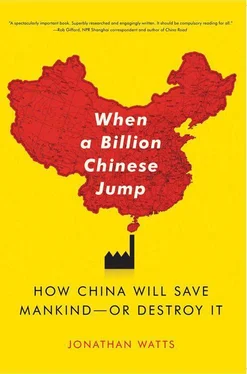At the time of my visit, there was once again a huge trade imbalance. But this time, the shortfall was being made up not by drugs but by garbage. 5The economics were logical. It was cheaper to send a container of waste from London to Guangdong on an otherwise empty ship than it was to truck it to Manchester. 6
Adam Smith, the father of capitalism, would probably have considered this business as usual. In the eighteenth century, he described how China’s poor were so wretched they ate rubbish: “They are eager to fish up the nastiest garbage thrown overboard from any European ship. Any carrion, the carcase of a dead dog or cat, for example, is as welcome to them as the most wholesome food to the people of other countries.” 7
But sending waste to the other side of the world was fraught with environmental, health, and ethical hazards. Although recycling could save more carbon emissions than simply dumping the waste in a landfill, the rubbish shipments put an irresponsible distance between consumption and its consequences. 8People in other countries were being exposed to risks and pollution that wealthy foreign consumers were not willing to accept themselves.
The garbage had been building up for decades. In the mid-sixties, the philosopher Alan Watts was among the first to anticipate a global waste crisis as he contemplated the incipient consumer culture of the United States and western Europe: “Can any melting or burning imaginable get rid of these ever-rising mountains of ruin—especially when the things we make and build are beginning to look more and more like rubbish even before they are thrown away?” 9
Since then, landfill sites in Europe, North America, and Japan have been filling up almost as fast as they were dug. The alternatives were not much better. Incinerators might reduce rubbish to ash, but, unless operated at very high temperatures, they foul the air with dioxins and other toxins. Meanwhile, we—the global consumer class—were buying ever more goods in ever more layers of wrapping.
Rather than cut down on consumption, which would hurt economic growth, governments encouraged citizens to recycle, which appeared to be a clean, efficient alternative to burning and landfilling. But all too often this meant sending the waste overseas, particularly to China. 10The rubbish was not supposed to be dumped. That was prohibited by EU and U.S. law, but shipments of nonhazardous waste were permitted for recycling. 11This loophole allowed rich nations to deceive themselves that they were cleaning up, even though little or no effort was made to ensure the shipped waste was dealt with properly at the other end. In effect, much of it was swept under a Guangdong carpet.
Not surprisingly, the dubious ethics involved prompted comparisons with the opium trade. 12But the Guangdong authorities were as indifferent to illegal waste as their Cantonese forebears were to illicit drugs. Perhaps the province’s geography has shaped its destiny. Lying close to foreign borders and far from the center of state power in Beijing, the control-dodging character of the region is encapsulated in the expression shangao huangdiyuan, “the mountains are high and the emperor far away.” This far south, the authority of the state is stretched to its limits. A locally based UK diplomat once told me she proposed a collaboration with the Guangdong officials based on new energy efficiency laws that had just been passed by the state. The response: “We don’t think those laws apply to us.”
Weak governance and dire pollution go hand in hand. China’s political system is neither dictatorship nor democracy. For the environment, it contains the worst elements of both. At the top, the state lacks the authority to impose pollution regulations and wildlife conservation laws, while at the bottom citizens lack the democratic tools of a free press, independent courts, and elections to defend their land, air, and water. The gap in between is filled by local governments, township enterprises, migrant workers, and foreign corporations, many of which are focused on economic growth at the expense of all else. The result is neither red nor green; it is black or gray. Money is concentrated in this bulging middle belt, which is also the main source of corruption and pollution. With such weak regulation and political accountability, rubbish can be sent to Guangdong in the name of nonhazardous recycling, but the end result is often toxic rubbish dumps that damage the health of local people.
Guiyu is the world’s computer graveyard. 13To get there, I drove through giant manufacturing towns I had never heard of, including Chendian, which billboard after billboard of giant seminaked women declared to be the global center of bra production. Farther along the road, the skies darkened and rain began tapping on the taxi roof. I passed a funeral procession. The mourners wore transparent plastic macs over their traditional white funeral garb as they walked through the drizzle. Soon after, I reached the town where motherboards went to die, where hard drives were softened up, and memory cards were erased beyond the reach of any Control Z. The streets were stacked with green circuit boards, computer casings, and reams of cables, leads, and wires. Locals sat among mounds of brightly colored plastic, hand-sorting the waste by shade and type.
Stopping and talking to locals was risky. The dirty conditions and low wages made e-waste a sensitive topic. Several journalists had previously been detained here. At least one team had been attacked. 14I asked the driver to park on a side road, where my Western face and the taxi’s out-of-town number plate would attract less attention. I wandered over to a makeshift outdoor workshop where a bare-chested old man was sorting through huge earthenware pots of tiny plastic pellets under a net awning. The colors were separated in tubs of chemical compounds: green pellets sank, purple floated to the surface. It was a smelly, time-consuming process for which the man earned about 40 yuan per day. He said he had been processing waste from around the world for twenty years, but his garrulity ended as a crowd gathered. The old man asked me to leave: “No journalists. I already get into trouble from time to time with the tax authorities.”
It was a similar story in dozens of small warehouses nearby. In one, a child was helping to strip circuit boards. In another, a woman removed whatever white plastic she could find from a pile of computers and printers for 20 yuan (about $3.00) per day. Next door, two Sichuanese women earned 36 yuan for a thirteen-hour shift, picking apart motherboards. “We know it might be toxic, but what can we do? It’s a job,” one of them told us. “We’re not scared.”
They should have been. Studies have revealed that the amount of lead in the blood of children in Guiyu is 50 percent higher than limits set by the U.S. Centers for Disease Control and Prevention, which could result in retarded mental development. Workers are also exposed to cadmium, chromium, polyvinyl chlorides, brominated flame retardants, and mercury—a toxic cocktail that can cause brain damage, cancer, or kidney failure. 15
Many of these chemicals leak from the hundreds of millions of computers, mobile phones, and other devices discarded overseas. 16Efforts to make manufacturers share responsibility with retailers, consumers, and governments for the lifespan of their products have had only partial success. 17American companies often falsely claim to be recycling domestically while actually shipping e-waste to China and elsewhere, using shell companies in Hong Kong and Singapore. Interpol has identified waste smuggling as a thriving business for crime organizations worldwide. Eddy Zheng, who studied the e-garbage problem at the Guangzhou Institute of Geochemistry, believes the rapid increase of e-waste coming into China might be out of control: “The government does not have resources to stop this. Many foreign companies take advantage of this to illegally import e-waste into China.” 18He is scathingly sarcastic about foreign efforts to restrict the trade. “The U.S. is too generous in its contribution to China’s environmental contamination,” he said. 19
Читать дальше










